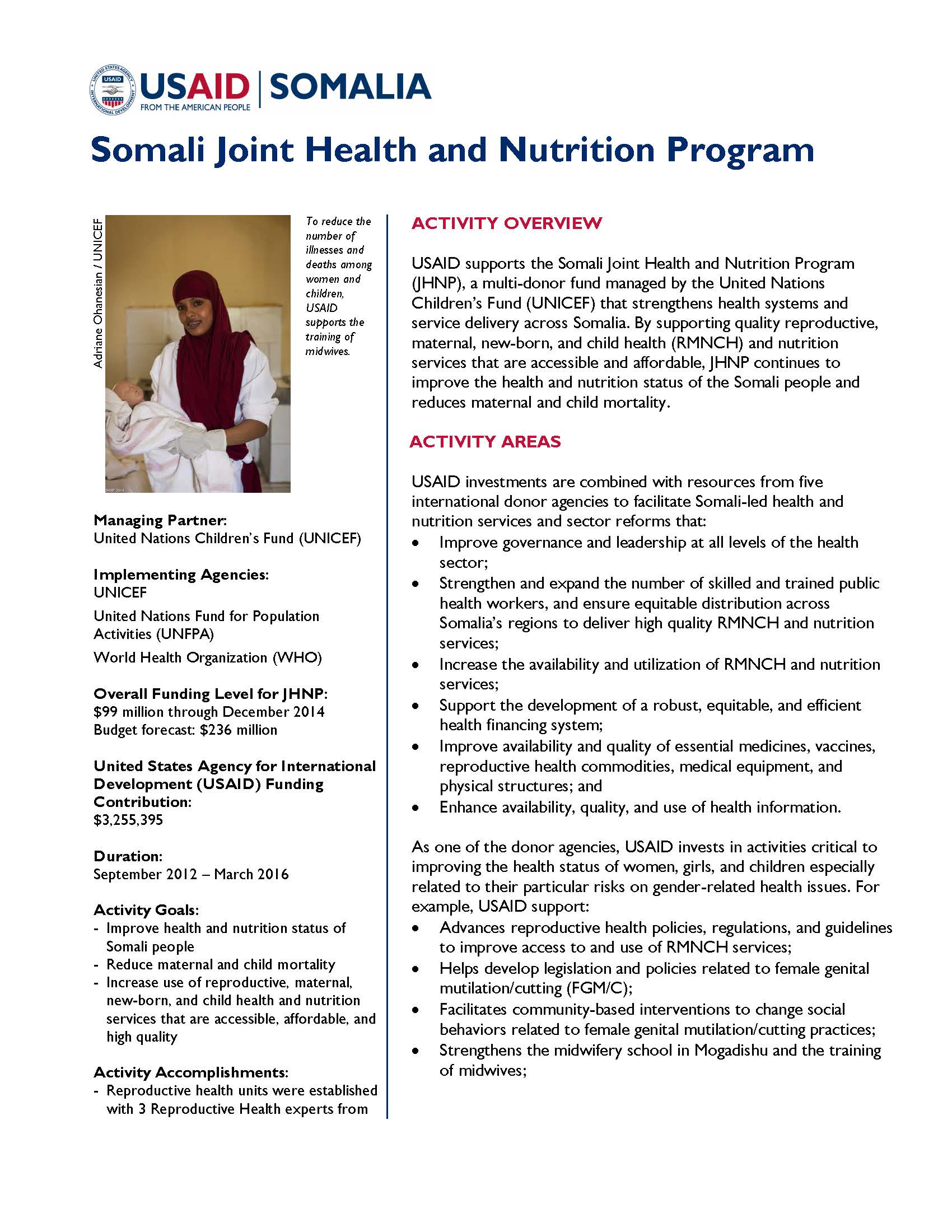Somali Joint Health and Nutrition Program ![]() (pdf - 126k)
(pdf - 126k)
Managing Partner:
United Nations Children’s Fund (UNICEF)
Implementing Agencies:
UNICEF
United Nations Fund for Population Activities (UNFPA)
World Health Organization (WHO)
Overall Funding Level for JHNP:
$99 million through December 2014
Budget forecast: $236 million
United States Agency for International Development (USAID) Funding Contribution: $3,255,395
Duration:
September 2012 – March 2016
Activity Goals:
- Improve health and nutrition status of Somali people
- Reduce maternal and child mortality
- Increase use of reproductive, maternal, new-born, and child health and nutrition services that are accessible, affordable, and high quality
Activity Accomplishments:
- Reproductive health units were established with 3 Reproductive Health experts from the Diaspora, along with working groups and female genital mutilation task forces in each region
- More than 120 health workers were trained on maternal and child health services using a standardized curriculum in all three regions
- Essential medicines, supplies, and nutrition commodities, as well as reproductive health commodities, were made available
Contributing Donors:
Australian Department of Foreign Affairs and Trade
Finnish Development Cooperation
United Kingdom Department for International Development (DFID)
USAID
Swedish International Development Cooperation Agency (Sida)
Key Partners:
Ministry of Health, Federal Government of Somalia
Ministry of Health, Puntland
Ministry of Health, Somaliland
Activity Locations:
Puntland (Nugal, Mudug and Bari)
Somaliland (Togdheer, Awdal and Sanaag)
South Central Somalia (Lower Juba, Galgadud and Benadir)
ACTIVITY OVERVIEW
USAID supports the Somali Joint Health and Nutrition Program (JHNP), a multi-donor fund managed by the United Nations Children’s Fund (UNICEF) that strengthens health systems and service delivery across Somalia. By supporting quality reproductive, maternal, new-born, and child health (RMNCH) and nutrition services that are accessible and affordable, JHNP continues to improve the health and nutrition status of the Somali people and reduces maternal and child mortality.
ACTIVITY AREAS
USAID investments are combined with resources from five international donor agencies to facilitate Somali-led health and nutrition services and sector reforms that:
- Improve governance and leadership at all levels of the health sector;
- Strengthen and expand the number of skilled and trained public health workers, and ensure equitable distribution across Somalia’s regions to deliver high quality RMNCH and nutrition services;
- Increase the availability and utilization of RMNCH and nutrition services;
- Support the development of a robust, equitable, and efficient health financing system;
- Improve availability and quality of essential medicines, vaccines, reproductive health commodities, medical equipment, and physical structures; and
- Enhance availability, quality, and use of health information.
As one of the donor agencies, USAID invests in activities critical to improving the health status of women, girls, and children especially related to their particular risks on gender-related health issues. For example, USAID support:
- Advances reproductive health policies, regulations, and guidelines to improve access to and use of RMNCH services;
- Helps develop legislation and policies related to female genital mutilation/cutting (FGM/C);
- Facilitates community-based interventions to change social behaviors related to female genital mutilation/cutting practices;
- Strengthens the midwifery school in Mogadishu and the training of midwives;
- Builds the capacity of clinical staff in maternal and new-born health, including comprehensive emergency obstetric care and anesthesia; and
- Trains health staff, including community health workers in child health and nutrition.
ACTIVITY IMPACT
JHNP, with USAID support, has established reproductive health units, working groups, and task forces in Puntland, Somaliland, and South Central Somalia to address strategic issues involving RMNCH services in the long term. These units are staffed by Reproductive Health experts from the Somali Diaspora who were recruited to strengthen the capacity of health ministry staff in each region and develop policies and plans on Reproductive Health. USAID activities build support at both the government- and community-level for the reduction and/or abandonment of the practice of FGM/C which is a significant factor contributing to maternal mortality in Somalia. Interventions are focused on 81 communities with the potential to abandon the practice of FGM/C, as well as on policy development, legislation, and advocacy around abandoning the practice of female genital mutilation/cutting in all three regions.
Curricula for comprehensive emergency obstetric care for clinical staff has been developed and used by the World Health Organization to train 70 clinical staff. Furthermore, a curriculum to train community health workers was developed and endorsed by the Ministries of Health in Puntland and South Central Somalia. Increasing the number of skilled clinicians lead to better quality emergency obstetric and newborn care.
Finally, USAID-funded activities established and strengthened nine midwifery schools in the three regions. Specifically, USAID resources focused on strengthening the midwifery school in Mogadishu, and training 40 midwives at the school in order to increase the number of skilled birth attendants able to handle complications which can cause maternal mortality and morbidity.
JHNP Contact:
Raza Zaidi
Senior Program Manager
UNICEF Tel: +254 706 171 790
Email: razaidi@unicef.org
USAID Contacts:
Tyler Beckelman, Director
USAID/Somalia
Tel: +254 20 862 2834
Email: tbeckelman@usaid.gov
Marybeth McKeever
USAID/Somalia
Social Services Team
Tel: +254 20 862 2191
Email: mmckeever@usaid.gov








Comment
Make a general inquiry or suggest an improvement.